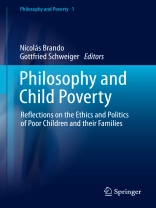This book offers a broad and diverse reflection of the ways in which child poverty could be conceptualised, and the ways in which it is intertwined with childhood as a specific social condition. Furthermore, the responsibilities towards children and the possible mechanisms required for dealing with this condition will be analysed and clarified.
This is the first volume on philosophy and child poverty. Despite the increasing number of publications on poverty, the particular phenomenon of poverty during childhood has not received much philosophical attention. This is surprising, given the severity and depth of child poverty around the globe.
This volume brings together various philosophical approaches and how they understand and tackle child poverty. This is an important addition to the philosophical literature, which is also of wider interest to scholars working in the social sciences and with an interest in child poverty.
สารบัญ
Introduction; Nicolás Brando and Gottfried Schweiger.- Section I: Definitions and Measurements.- Chapter 1. Child poverty, impoverished parenting, and normative childhood: some words of caution; Douglas Hanes.- Chapter 2. Children in Measurements of Poverty within Populations: Two Problems with Current Indexes; Katarina Pitasse.- Chapter 3. Poverty, Social Expectations, and the Family; Jonathan Wolff.- Chapter 4. Beyond the Material Wounds of Child Poverty: The Conceptualization of Child Povertz as Moral Damage; Mar Cabezas and Carlos Pitillas.- Section II: Children and Families Living in Poverty.- Chapter 5. Making them strong? Vulnerability and resilience in poor children; Alexander Bagattini and Rebecca Gutwald.- Chapter 6. Humiliation and Child Poverty; Gottfried Schweiger.- Chapter 7. Education, Voice and Empowerment: Learning with and from Children in Poverty; Yasmin Rosie N. and Dadvand Babak.- Chapter 8. The Nature of Nurture: Poverty, Father Absence and Gender Equality;Alison Denham.- Chapter 9. ‘I’ve been trying to change my life heaps but I always end up back here’. The complex relationship between poverty, parental substance dependency, and self-control; Anke Snoek.- Chapter 10. Disability and Child Poverty; Sarah Gorman.- Chapter 11. Precarity of Childhood; Jennifer Ang.- Chapter 12. Children in liminality: Case studies from Ireland and Iran; Annie Cummins and Amin Sharifi Isaloo.- Section IV: Rights, Responsibilities, and Policies.- Chapter 13. A Duty-Based Approach to Children’s Right to Freedom from Extreme Poverty; Stamantia Liosi.- Chapter 14. Towards an Ontological Approach to Care and Child Poverty; Georgios Karakasis.- Chapter 15. Civic Tenderness as a Response to Child Poverty in America; Justin Clardy.- Chapter 16. Parenting the Parents: The Ethics of Parent-Targeted Paternalism in the Context of Anti-Poverty Policies; Douglas Mac Kay.- Chapter 17. Is poverty eroding parental rights in Britain? The case of child protection inthe early 21st centry; Alicia-Dorothy Mornington and Alexandrine Guyard.
เกี่ยวกับผู้แต่ง
Nicolás Brando is a Research Fellow for the “Global Governance and Democratic Government” Programme at the Leuven Centre for Global Governance Studies (KU Leuven), and a Ph D scholar at the Institute of Philosophy (KU Leuven). He works on moral and political philosophy, particularly on issues of global justice, education and childhood. His work has been published in the Journal of World Trade, Global Policy and International Journal of Educational Development, among others.
Gottfried Schweiger is a Senior Scientist at the Centre for Ethics and Poverty Research, University of Salzburg. He works in social and political philosophy. Previous publications include (co-authored with Gunter Graf) “A Philosophical Examination of Social Justice and Child Poverty” (Palgrave Macmillan 2015) and (co-edited with Johannes Drerup, Gunter Graf and Christoph Schickhardt) “Justice, Education and the Politics of Childhood” (Springer 2016).












